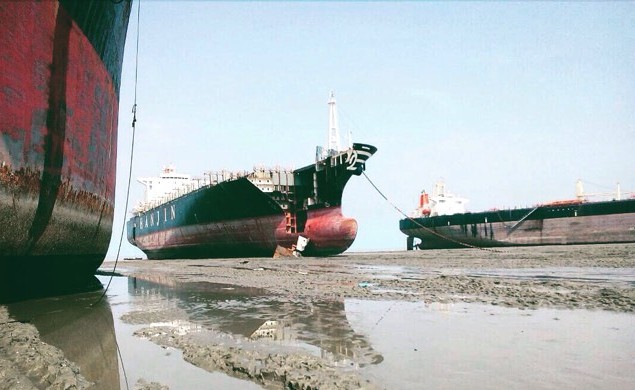Platform News – Worker killed when breaking the Hanjin Rome
And another worker dies in May at Chittagong yard with an appalling accident record
Two workers lost their lives at the Chittagong shipbreaking yards in the last two weeks, bringing the total death toll this year to six workers.
On 6 May, 26-year-old Shahinoor died at Jamuna Shipbreaking yard. He fell from a great height when he was breaking the HANJIN ROME, which was the first vessel arrested after the collapse of one of the largest container ship companies last year – the Korean company Hanjin Shipping. The HANJIN ROME was put up for auction by the High Court in Singapore to be sold to the highest bidder early this year. Unsurprisingly, the highest bids for buying ships for scrap come from cash buyers that sell to the South Asian beaching yards who can offer higher steel prices with minimal disposal and labour costs and safeguards. This is not the first time that courts, in deciding on bankruptcy cases, completely ignore the environmental and human repercussions of selling shipping assets to beaches, with the sole purpose of sorting out failed companies’ balance books. Deaths on the beaches have also been a direct consequence from bankruptcy cases in Germany, such as the sale of the KING JUSTUS to Alang and the VIKTORIA WULFF to Chittagong.
On 9 May, winch operator Ishaq was smashed by the wire cable and died on the spot at KR Steel. This is the second fatal accident this year at the plot – another fatal accident happened in February at BBC Shipbreaking yard which is under the same ownership as KR Steel. According to local sources, KR Steel was dismantling the vessels SEA ZENITH and KOTA WISATA when Ishaq was killed. The former was owned by the Thai shipping group Sang Thai & Sinsimon. The latter was owned by Singapore-based Pacific International Lines (PIL), one of the top containership operators in the world. PIL sent nine end-of-life vessels to the beaches of South Asia in the last four years. Six ended up in the worst yards on the shores of Chittagong.

Earlier this year the Institute for Global Labor and Human Rights (IGLHR) published a detailed account of the fatal accidents that killed 19 workers in Chittagong in 2016. The report includes interviews with workers that describe harsh conditions, lack of protective equipment, exposure to toxic gases and fumes, and a constant fear of dying at work: “There are enclosed dark places on the ship, where there is no ventilation. The cutters go in first [to cut holes in the sides to let light in]. Especially they get sick and nauseous,” a worker reports to IGLHR. “All of us cutters get sick from the chemicals. It always happens,” other workers add. “I work at night because the owner wanted me to work the night shift,” says a worker, adding “it is cooler. You sweat less. So for me, it is better. But it is more dangerous. That is the biggest worry: It is very risky. At any time, I could lose my life”.
Activists and workers in Bangladesh recently raised their voices on two important days for workers’ rights. On 28 April, the World Day for Health & Safety at Work, the Platform member Bangladesh Occupational Safety, Health and Environment (OSHE) foundation organised a rally and a human chain to raise awareness on the precarious conditions at the Chittagong shipbreaking yards. Workers affected by asbestosis or having suffered injuries joined OSHE for further discussions on how to strengthen claims for compensation. On 1 May Chittagong-based Platform member Young Power in Social Action (YPSA) organised a human chain and a rally gathering more than 100 workers and their family members.

In an attempt to hide the accident, the yard management kept the body of Shah Jahan inside the premises, but fellow workers and locals rushed to the site and started demonstrating. The body was consequently sent to the morgue of the Chittagong Medical College Hospital. The following day, the worker was quickly buried without a post mortem. Platform member organisations in Bangladesh attended the funeral and now seek to support the victim’s relatives. The family and the yard owners have settled for a one-off payment and a monthly allowance to help them cover their living costs. However, money will not be able to replace Shah Jahan who leaves behind a wife and a young child.

Related news

Press Release – NGOs release new report on North Sea oil and gas recycling
The NGO Shipbreaking Platform released today a report on offshore decommissioning during a seminar held in Oslo, Norway.
... Read More
Platform News – Performance With Bare Hands (Live) in Brussels
The NGO Shipbreaking Platform invites you to attend the artistic performance With Bare Hands (Live) on Friday 21 June in Brussels (Belgium).
... Read More
Press Release – Polluting shipbreaking practices threaten Ghanian shores
Ship demolition is causing marine pollution in Kpone and surrounding towns.
... Read More
Press Release – Platform publishes list of ships dismantled worldwide in 2018
744 large ocean-going commercial vessels were sold to the scrap yards in 2018. Of these vessels, 518 were broken down on tidal mudflats in South Asia.
... Read More
Press Release – MSC urged to align its operations with international environmental and labour rights standards and stop dumping its toxic waste on South Asian beaches
In the last six months only, MSC scrapped 9 ships on the beach of Alang in India – 27 in the last two years,
... Read More
Platform News – Prison sentence for attempted illegal export of the Harrier reveals reckless actions by all parties involved
The judgment, now available in English, provides shocking insights into the role played by all parties involved in the sale and transport of the end-of-life vessel.
... Read More

